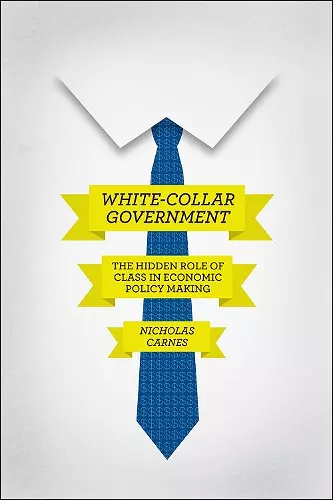White-Collar Government
The Hidden Role of Class in Economic Policy Making
Format:Paperback
Publisher:The University of Chicago Press
Published:6th Dec '13
Currently unavailable, and unfortunately no date known when it will be back

Eight of the last twelve presidents were millionaires when they took office. The figure is above fifty percent among current Supreme Court justices, all nine of whom graduated from either Harvard or Yale. Millionaires also control Congress, where a background in business or law is the norm and the average member of the House or Senate has spent less than two percent of his or her adult life in a working-class job. Why is it that most politicians in America are so much better off than the people who elect them - and does the social class divide between citizens and their representatives matter? With White-Collar Government, Nicholas Carnes answers this question with a resounding - and disturbing - yes. Legislators' socioeconomic backgrounds, he shows, have a profound impact not only on how they view the issues but also on the choices they make in office. Scant representation from among the working class almost guarantees that the policymaking process will be skewed toward outcomes that favor the upper class. It matters that the wealthiest Americans set the tax rates for the wealthy, that white-collar professionals choose the minimum wage for blue-collar workers, and that people who have always had health insurance decide whether to help those without. And while there is no one cause for this crisis of representation, Carnes shows that the problem does not stem from a lack of qualified candidates from among the working class. The solution, he argues, must involve a variety of changes, from the equalization of campaign funding to a shift in the types of candidates the parties support. If we want a government for the people, we have to start working toward a government that is truly by the people. White-Collar Government challenges long-held notions about the causes of political inequality in the United States and speaks to enduring questions about representation and political accountability.
" 'Where you stand depends on where you sit' is a maxim seldom applied to the economic backgrounds of legislators. But Nicholas Carnes's eye-opening study shows social class and work experience to be key determinants in shaping how Congress and state legislatures write laws and shape policies." -Timothy Noah, author of The Great Divergence: America's Growing Inequality Crisis and What We Can Do About It"
ISBN: 9780226087146
Dimensions: 23mm x 15mm x 1mm
Weight: 340g
200 pages